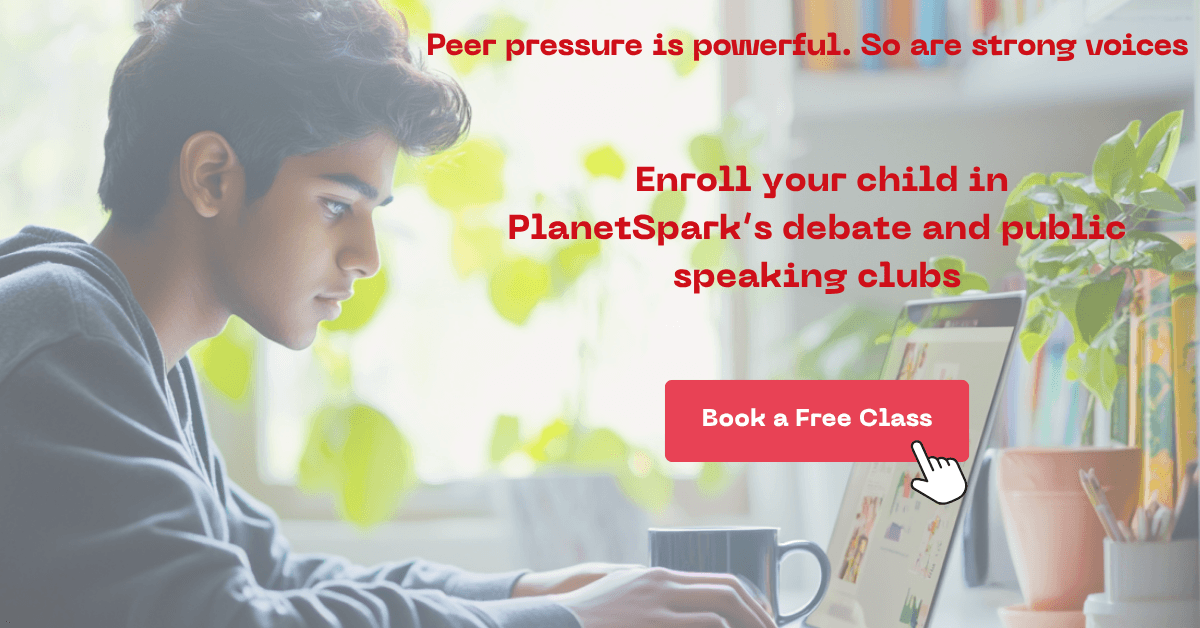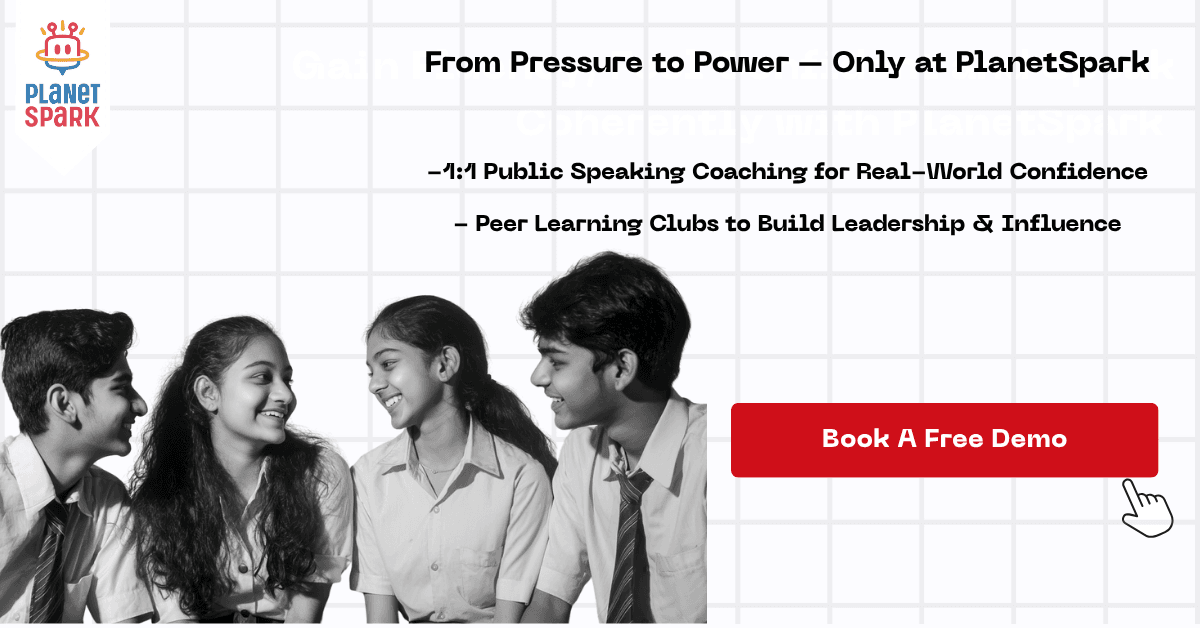How Peer Pressure Helps Students Grow as Individuals
Last Updated At: 7 Jul 2025
6 min read

Table of Contents
- Does Peer Pressure Help Students Grow as Individuals?
- What Is Peer Pressure?
- The Positive Side: How Peer Pressure Can Help Students Grow
- The Risks: When Peer Pressure Turns Harmful
- Tips for Students: How to Handle Peer Pressure
- Tips for Parents: How to Support Your Child Through Peer Pre
- Real-Life Example: The Power of Positive Peer Influence
- How PlanetSpark Builds Confidence to Handle Peer Pressure
- FAQs on Peer Pressure and Student Growth
Does Peer Pressure Help Students Grow as Individuals?
Yes, peer pressure can help students grow when the influence is positive. Supportive peer groups can boost self-confidence, academic motivation, and leadership skills. But it’s important to guide children on recognizing the difference between helpful and harmful peer pressure.
What Is Peer Pressure?
Peer pressure is the influence exerted by a peer group on an individual, often to adopt certain behaviors, values, or habits. It can be positive or negative, depending on the circle of influence.
For students, peer pressure begins at an early age and becomes more pronounced during adolescence. As children grow, it’s natural for them to look to their friends for cues, advice, and social approval. The key is helping them identify which influences help them grow and which pull them back.
The Positive Side: How Peer Pressure Can Help Students Grow
While the term "peer pressure" is often associated with poor choices, it can also serve as a powerful motivator for growth. Here's how:
Skill Development
Being around high-performing or motivated peers can inspire students to adopt better study habits, improve their public speaking skills, or participate in extracurriculars.Academic Motivation
Students often push themselves harder when surrounded by peers who value performance and learning.Healthy Risk-Taking
Peer encouragement can push a student to audition for a play, present in class, or try a new activity they would normally avoid.Empathy and Teamwork
Positive peer groups foster cooperation, understanding, and emotional maturity.Accountability
A peer who sets good examples often becomes a role model, encouraging responsibility and goal-setting in others.

The Risks: When Peer Pressure Turns Harmful
Despite its benefits, peer pressure can also lead to poor decisions. Here’s what to watch out for:
Risky Behavior
Peers may encourage skipping class, cheating, or experimenting with drugs and alcohol, especially during the teen years.Low Self-Esteem
Students may start questioning their choices or values if they constantly feel the need to "fit in."Mental Stress
Trying to keep up with trends or peer expectations can be exhausting and emotionally draining.Social Media Pressure
Platforms like Instagram and Snapchat add another layer of peer comparison that affects students’ mental health and self-worth.
Tips for Students: How to Handle Peer Pressure
Not all peer pressure is bad, some can actually motivate you to do better. But it’s important to recognise the difference. Positive peer pressure lifts you up, helps you grow, and encourages you to be your best self. On the other hand, negative peer pressure pushes you to do things that feel wrong, unsafe, or uncomfortable. When that happens, it’s okay to say “no” and mean it. You don’t need to explain yourself or go along with something just to fit in.
Try to surround yourself with friends who share your values and support your goals. When you're with people who make you feel respected and included, you’re more likely to stay true to yourself. It also helps to practice how you might respond in tough situations. Role-playing with a parent, teacher, or mentor can help you become more confident and assertive when you need to speak up.
Having even one trusted friend who can stand with you makes a big difference. And if you ever feel overwhelmed or unsure, don’t keep it to yourself, talk to someone you trust, like a teacher, school counsellor, or your parents. You’re never alone, and speaking up shows strength, not weakness.
Tips for Parents: How to Support Your Child Through Peer Pressure
As a parent, you may not be able to choose your child’s friends, but you can absolutely guide them to choose wisely and think independently. One of the most important things you can do is keep the conversation open. Let your child know that they can talk to you about anything, whether it’s about fitting in, pressure from friends, or things they’re unsure about. Just knowing that you’re there to listen without judgement can make a huge difference.
Help your child build a strong sense of self by reinforcing their confidence. Children who feel secure and valued are far less likely to give in to peer pressure just to feel accepted. Pay attention to the company they keep, try to get to know their friends and, when needed, connect with other parents or teachers if something feels off.
It’s also important to teach them how to navigate the online world. Social media often amplifies peer pressure, so discuss privacy settings, online behavior, and how not everything they see online reflects reality.
Finally, encourage your child to think for themselves. Help them weigh the pros and cons before making decisions, big or small. When they start trusting their own judgement, they’ll be far better equipped to stand their ground, even when others don’t.
Real-Life Example: The Power of Positive Peer Influence
A 13-year-old student who struggled with stage fright joined a group presentation activity at school. Watching her friends rehearse gave her the courage to try. With continued peer support, she eventually participated in a storytelling competition and won third place. This is how positive peer pressure can transform self-doubt into self-belief.

How PlanetSpark Builds Confidence to Handle Peer Pressure
At PlanetSpark, we teach children not just how to speak well, but how to stand up for themselves, make good choices, and lead others.
Here’s how we do it:
1:1 Public Speaking Coaching
Build confidence, voice clarity, and expression through guided speaking practice.Debates, speeches, and peer reviews
Structured peer feedback develops listening, critical thinking, and team respect.Creative Writing Modules
Help students explore values, identity, and real-life situations like peer pressure through storytelling and journaling.Learning Communities like SparkX
Students engage in competitions and group learning environments where healthy peer influence is encouraged.
Want your child to become confident and independent in any group?
Book a FREE trial class with PlanetSpark now.
FAQs on Peer Pressure and Student Growth
1. How does peer pressure influence student growth?
Positive peer pressure encourages students to try new things, set goals, and become more confident. It can lead to higher motivation and better social skills.
2. What’s the difference between positive and negative peer pressure?
Positive peer pressure supports good decisions, such as studying or participating in clubs. Negative pressure encourages risky behavior or conformity that feels wrong.
3. How can I teach my child to resist bad peer pressure?
Teach assertiveness, role-play scenarios, and help your child develop confidence and clear values.
4. What are some signs that my child is under harmful peer pressure?
Sudden behavioral changes, secrecy, withdrawal from family, or emotional distress can all be signs.
5. Can peer pressure affect academics?
Yes. Positive peer pressure can improve academic performance. Negative pressure may lead to distraction, cheating, or missed classes.
6. How can public speaking help fight peer pressure?
Public speaking builds confidence, voice control, and decision-making skills, which help children stand their ground in group settings.
7. Does PlanetSpark help with emotional and social development?
Yes. Our courses focus on communication, confidence, and leadership, helping children thrive in both peer and academic settings.
Personalized Communication Report
Record a video to get a AI generated personalized communication report for your child
Select Learner's Class

Hi There, want to try these
tips for your child with
LIVE with our expert coach?
Let's check your child's
English fluency
